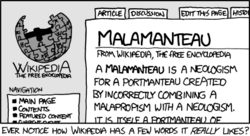In the arts and entertainment
In art

The Wikipedia Monument , located in Słubice, Poland, is a statue designed by Armenian sculptor Mihran Hakobyan honoring Wikipedia contributors. It was unveiled in Frankfurt Square (Plac Frankfurcki) on 22 October 2014 in a ceremony that included representatives from both local Wikimedia chapters and the Wikimedia Foundation. [2] [3]
In music
A scene in the 2006 music video for the "Weird Al" Yankovic song "White & Nerdy" shows Yankovic vandalizing the Wikipedia page for Atlantic Records, replacing it with the words "YOU SUCK!", referencing recent trouble he had had with the company in getting permissions. [4]
Ukrainian composer Andriy Bondarenko wrote a musical piece, "Anthem of Wikipedia", which was performed in a concert devoted to the 15th anniversary of Wikipedia in Kyiv in 2016. [5] [6]
In webcomics

References to Wikipedia have been made several times in the webcomic xkcd . A facsimile of a made-up Wikipedia entry for "malamanteau" (a stunt word created by Munroe to poke fun at Wikipedia's writing style) provoked a controversy. [7] [8]
In humor
During the Russo-Ukrainian war, a meme titled Battle of Techno House 2022, which features footage of a Russian soldier's failed effort at opening a door, went viral and was reposted millions of times. [9] Media coverage included discussion of an initial Wikipedia page for the incident/meme, which lampooned the event by using Wikipedia formatting generally used only for actual battles, making it seem like a real battle. The belligerents in the "battle" were humorously listed as "Russian Soldier" and "store door" with the battle results referred to as a "decisive door victory" and "pride" referred to as one of the Russian casualties. [10] [11] [12] The humorous content was later removed from the Wikipedia page. [13]
In fiction
In drama-film Tár (2022), Lydia Tár discovers her Wikipedia page being anonymously vandalized, contributing to her mental health decline. [14] [15]
The 2024 novel The Editors, by Stephen Harrison, centers around editors of Infopendium, an online encyclopedia based on Wikipedia. [16] [17] [18]
The 2025 novel The Expert of Subtle Revisions, whose cover is styled after a Wikipedia article, follows a historical mystery with clues scattered throughout Wikipedia edits and deleted articles. [19]